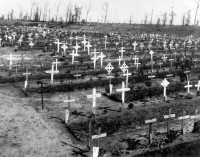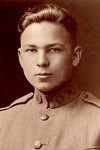In Flanders fields the poppies blow
Between the crosses, row on row,
That mark our place: and in the sky
The larks still bravely singing fly
Scarce heard amid the guns below.
We are the dead: Short days ago,
We lived, felt dawn, saw sunset glow,
Loved and were loved: and now we lie
In Flanders fields!
Take up our quarrel with the foe
To you, from failing hands, we throw
The torch: be yours to hold it high
If ye break faith with us who die,
We shall not sleep, though poppies grow
In Flanders fields
(Composed at the battlefront on May 3, 1915 during the second battle of Ypres, Belgium by Lt. Col. John McCrae, British Expeditionary Force)
The guns fell silent 93 years ago today. On the eleventh hour of the eleventh day of the eleventh month of 1918, the fifth year of the devastation and destruction that defined the so-called Great War, the fighting stopped, men and boys at arms stood down, and WWI was over. Though political intrigue and fighting would continue in places like Finland, Estonia, Russia, and the Middle East as world leaders tried to redraw and redefine the global map, with the Armistice, the war was declared “over” and American soldiers, sailors, and Marines (who, in the last year of the war had been deployed to shore up the French, British, Italian, Canadian and other allied forces against the Germans and Austrians) began to dream of returning home.
Home.
I sit this Armistice Day (renamed “Veteran’s Day” to honor all of the men and women who have fallen defending America across time) in the comfort of my little writing studio along the banks of the Cloquet River in northeastern Minnesota, never having fired a shot at another human being; never having clawed my way through mud on my belly in the face of combat; never having experienced the utter terror and degradation of war on a personal level. Oh, I served ever-so-briefly. My career as an Army Reservist was undistinguished and of short duration. It did not involve watching my friends and my enemies die. It involved typing at a unit typewriter (you remember typewriters, I’m sure) at a cozy desk in a warm office in Fort Snelling. But, despite my innocence, my naivete with respect to the horrors of combat, I think I understand. But of course, as interview after interview with the vanishing heroes of another war (members of, as Tom Brokaw proclaimed, “The Greatest Generation”) have revealed I know nothing about war. So I will not pretend, as I sit contentedly in my bathrobe sipping hot coffee and listening to classical music as I type this piece, to understand what our young men and women in uniform posted in Iraq and Afghanistan are experiencing. I cannot relate to their reality any more than I can relate to the experiences of Frank Buckles and the other young men who stood the trenches on the eleventh hour of the eleventh day of the eleventh month so many years ago.
And now, they are all gone. Buckles was the last: The last American veteran of WWI. He died this year. He died, in some ways, unhappy: He had lobbied, to the end of his days, for a memorial to be erected to honor those who fought and died (improvident as the war might have been) as Americans under arms in the Great War. Perhaps it is too distant a time, too far a journey back, for the public to care enough (or at all) about their service. But Buckles cared: He knew the terror, the blood, the horrors of trench warfare and its impact on those who survived and how, for nearly five years, political forces on both sides of the conflict moved young men around strategically, like pieces manuevered by chess masters, with little regard for their dignity or their lives. They called it the Great War: Those who served and saw would tell you that there was nothing magnificent or heroic about it at all, that in the end, twenty million human beings (more than six million of that number were civilians) died because of a madman’s political insult. And though, in some ways, WWI was the end, for empires and old alliances, it was also the beginning: Science and technology impacted the way men would kill each other in that, for the very first time, masses of humanity could be dispatched from a distance by the use of modern weaponry. Despite the distance of time, on this eleventh day, of the eleventh month, of the eleventh year of a new century, how much, dear readers, has really changed? How much have we humans really learned?
Today, take a moment away from your coffee cups, from your cozy enclaves, from the safety and security of your existence here at home and say a prayer, or recite a poem, or simply remain silent in honor of those boys who stood (and still stand) the trenches, and for the women who minister to the wounded, guard our positions, and transport our troops. Whether you believe we need to be in Iraq and Afghanistan isn’t the issue. When you remember the eleventh hour of the eleventh day of the eleventh month remember this as well: We asked and they said “yes”.
American men and women who serve in uniform should be honored (for doing what the rest of us cannot or will not do) regardless of our personal politics.
Peace.
Mark





Beautiful! Thank you for sharing your thoughts, and for putting Flanders Fields on your blog. Made my day!
Patty
Hey, wonderful to hear from you, Patty! Please pass on the blog link to others so I get folks reading. It’s a tough gig, this writer thing. I’ve got a book waiting the wings (Murder. Mormons. Montana. Minnesota.) but I can’t print until I sell. And I’m working on a sequel to the Finn book: Finland and Estonia and Karelia during WWII. Powerful stuff, I hope. A year away from a first draft.
So, the more folks who log on and read (and maybe buy a Munger book) the better. Have a great weekend. I’m listening to Springsteen (Darkness on the Edge of Town) as I type this and life is damn good.
Peace.
Mark